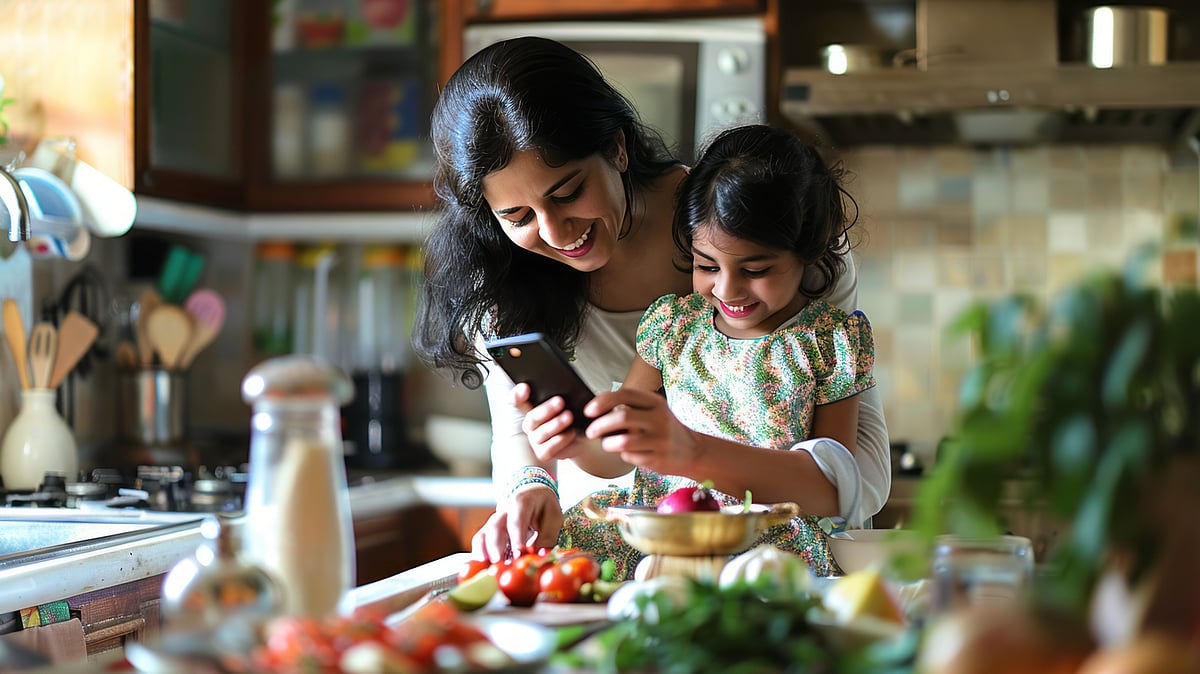Every morning, Harsheeta Gandhi, a media professional, wakes up to a message from her mom on WhatsApp. Sometimes it’s a beautiful image with a floral “Good Morning” quote in curly fonts. Other times, it’s a three-minute video about a miraculous haldi-chuna paste that can fix anything from a cough to heartbreak. Occasionally, it’s a news forward that may or may not have been verified by actual journalists.
“She’ll often ask me later in the day, ‘Did you see what I sent?’ or ‘Did you hear about that thing I forwarded?’ And the way she says it with so much care and curiosity always makes me smile,” Harsheeta says. “I know she sends these things because she’s thinking about me. It’s her way of looking out for me and sharing what she learns.”
“WhatsApp University, as we jokingly call it, is a big part of her life now. It keeps her connected, aware, and involved. And even though I know not everything she forwards is always accurate, what matters more to me is the intention behind it. It comes from love, from wanting to protect, from being a mom. Those messages are more than just forwards to me — they’re little pieces of her heart, sent every morning. And I wouldn’t want to start my day any other way,” she adds.
And she’s not alone.
From Dubai to Delhi, Toronto to Trichy, there exists a silent but formidable force: a generation of moms, aunties, and grandmothers who have become unexpected digital natives, forwarding, sharing, and broadcasting messages on WhatsApp like a well-oiled content machine. A machine powered not by algorithms or engagement metrics, but by emotion.
They are the unofficial deans of what the internet has come to affectionately call “Mom’s WhatsApp University.”
Maternal media empire
In the quiet hours of dawn or just after their evening tea, millions of moms across the world take to their phones — not to scroll endlessly like their children, but to share. Their daily dispatches include home remedies, devotional chants, real estate deals, inspiring quotes, recipes, old Bollywood songs, and warnings about “new scams.”
Yes, some forwards can be slightly… apocalyptic. But they also come with a soft corner. To them, sharing a message is like serving a hot roti — it’s their way of feeding love. A well-meaning mother may not understand the fact-checking culture of digital newsrooms, but she knows this: if it can help her child, whether it’s a turmeric hack or a cautionary tale, she must pass it on.
And what makes them truly endearing is the innocence and sincerity behind every forwarded message.
Just read it
Mridu Malhotra, 29, from Delhi, laughs as she recounts her experience. “My mom keeps on sending memes about daughters running away from marriage, as this is our current situation. Sometimes, I reply; sometimes, I ignore. But again, I know it is just her way of showing care and love.”
There is an entire generation of women who, while often dismissed by their tech-savvy children as digitally late bloomers, have quietly created one of the most consistent, emotionally intelligent networks of information-sharing on the planet.
Ankit Choudhary, 30, based in Mumbai, shares another slice of this digital affection: “My mother watches YouTube Shorts about cooking and keeps on sending them to me and my wife, as we live away from home.”
Anas Khan, 29, Delhi, says, “My mom has the habit of sharing ‘Mumbai home’ videos with me. She loves Mumbai. She wants to someday live in Mumbai. These videos truly inspire me to work hard and someday make her dream come true.”
These women may not always know the difference between a reel and a story, but they understand this: If something touched them, made them laugh, worried them, or inspired them, their child needs to know.
More than forwards
“My mom once forwarded me a video of a soldier returning home and hugging his daughter,” says Raghav, a 34-year-old banker. “I didn’t think much of it at the time, but when I asked her why she sent it, she said, ‘Because I feel like you work so far from home… and this made me miss you.’ I had to blink back tears.”
For every misinformed alert about how storing lemons in salt can cure depression, there’s an emotional undercurrent — a yearning to stay connected, to be relevant in their children’s fast-paced lives, to still be the go-to source of wisdom and protection.
Emotional marketing
If you think about it, brands spend millions to do what our mothers have mastered naturally — personalised, timely, emotionally resonant messaging. And all without a social media strategy.
Some marketers are taking note. A handful of campaigns are now targeting WhatsApp-forwarding moms as key influencers in tier-II and III cities. After all, who else can guarantee such wide message circulation with such trust-based influence?
But let’s be clear: our mothers didn’t ask to become content distributors. They did it because it’s in their nature to care, to share, to spread warmth even if it’s through a low-res image of tulips and a sparkly “Have a Blessed Day.”
Note to self
So the next time your mom sends you a video that begins with “Scientists in Japan have discovered…” or a meme about marriage with dancing emojis, don’t roll your eyes just yet. Take a moment to respond, even if it’s just a heart emoji.
Because, for all their occasional digital missteps, our mothers are running a university with no fees, no deadlines, and only one course: Unconditional Love 101.
And whether you admit it or not, you graduated from there.
